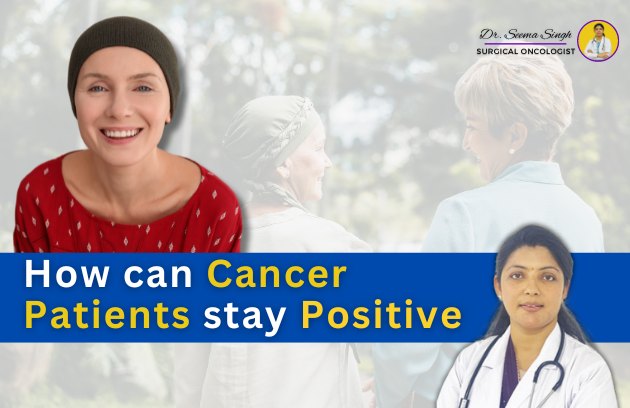- September 12, 2023
- Dr Seema Singh
- Comment: 0
- Cancer
How to Stay Positive when you have Cancer
Dealing with negative thoughts when you have cancer or are receiving treatment can be tough. When life gets challenging, it’s normal to have these upsetting thoughts. Being diagnosed with cancer and going through treatments can bring on worries and fears. Sometimes, you might try to distract yourself from these thoughts, but they can come back when you’re not busy. This can make you feel powerless, angry, or even dislike yourself. As a result, it can be hard to sleep, eat, or enjoy things you once did. If these thoughts keep going, they might even lead to depression. Here are some ways to help you handle these negative thoughts better.
Understanding Why You Feel Negative
One way to feel better when you have upsetting thoughts is to figure out what makes them happen. By thinking about what might be making you feel bad, you can understand yourself better and start making positive changes. For example, you can see if there’s a pattern to your negative thoughts and try to stop them from getting worse. It’s important not to always imagine the worst or think that everything will go wrong. Sometimes, there are problems with no easy solutions, and learning to accept them is important. If you’re finding it hard to do this on your own, talking to a counselor can be really helpful. They can support you in understanding your thoughts better and turning them into more positive ones that make you feel better about life.
Recognize the Good Things
You can feel better by focusing on the good stuff in your life. Try keeping a journal where you write down things that make you happy or that you’re thankful for. Each day, think about the good things that happened, even if they’re not big and fancy. It could be simple stuff like nice weather, a friendly chat with a pal, or just enjoying a tasty treat. Doing this helps you see more positive things and changes your negative thoughts into more cheerful ones.
Dealing with negative thoughts when you have cancer or are receiving treatment can be tough. When life gets challenging, it’s normal to have these upsetting thoughts. Being diagnosed with cancer and going through treatments can bring on worries and fears. Sometimes, you might try to distract yourself from these thoughts, but they can come back when you’re not busy. This can make you feel powerless, angry, or even dislike yourself. As a result, it can be hard to sleep, eat, or enjoy things you once did. If these thoughts keep going, they might even lead to depression. Here are some ways to help you handle these negative thoughts better.
Repeat a comforting phrase/prayer or affirmations
When things are tough, you can replace those upsetting thoughts with something that makes you feel better. It could be a comforting phrase, a special prayer, a favourite song, or a poem that brings you peace. Say it to yourself, taking slow, deep breaths as you do, and let go of your worries. This can help calm your mind and bring you some comfort during difficult times.
Practicing Yoga and Meditation
You can practice staying in the present, the “here-and-now,” by doing things like deep breathing and meditation. When you pay attention and stay aware of your thoughts, feelings, and what’s happening around you right at this moment, it can help you become stronger and more calm. You won’t react as strongly to things that bother you, and you’ll become more resilient.
Talk to Someone you know is suffering
Sometimes, people with cancer feel better when they talk to others who are going through similar things. Sharing your experiences and feelings with fellow patients can give you comfort and make you feel stronger. When you understand and support each other, it can help you be kinder to yourself and more caring toward others. But remember, it’s okay to reach out to others when you feel ready to do it emotionally.
Seek Professional Help
It’s okay to ask for help when you need it, and there’s nothing to be embarrassed about. If you ever feel really stressed, and it starts to affect your work, school, home life, or your relationships, think about talking to a counsellor or your cancer doctor. They’re trained to help with these things and can make a big difference.


